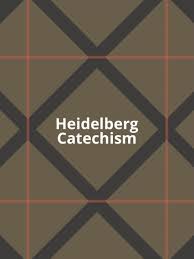Calvin on Thy Will be Done
The third petition e(a)The third petition is: that God’s will may be done on earth as in heaven [Matt. 6:10 p.]. Even though it depends upon his Kingdom and cannot be separated from it, still it is with reason added separately on account of our ignorance, which does not easily or immediately comprehend what it means that “God reigns in the world.” It will therefore not be absurd to take it as an explanation that God will be King in the
Heildelberg on Thy Will be Done
Question 124. What is the third petition? Thy will be done in earth as it is in heaven. That is: Grant that we and all men may renounce our own will, and yield ourselves, without gainsaying, to Thy will which alone is good; that so every one may fulfill his office and calling, as willingly and truly as the angels do in heaven. 1. The hidden will of God. Matt. 26:39. O my Father, if it be possible, let this cup pass from
Westminster on Thy Will be Done
Westminster Larger Catechism What do we pray for in the third petition? In the third petition, (which is, Thy will be done in earth as it is in heaven, (Matt. 6:10) ) acknowledging, that by nature we and all men are not only utterly unable and unwilling to know and do the will of God, (Rom. 7:18, Job 21:14, 1 Cor. 2:14) but prone to rebel against his word, (Rom. 8:7) to repine and murmur against his providence, (Exod. 17:7, Numb. 14:2)
Praying Your Kingdom Come
Based on Ps 145:1-14 I extol you for you are my God and my King. You sit enthroned above all things and all things were created for Christ, whether thrones or dominions or rulers or authorities (Col 1:15). Your throne, O God, is forever and ever. The scepter of your kingdom is a scepter of uprightness (Ps 45:6). Let your name be blessed forever and ever. Let our hearts be set on glorifying you every day. Let the meditations of our
Your Kingdom Come
We have been looking at the Lord's prayer in the series, ‘Pray Like This.’ This week we will be looking at the second petition, Your Kingdom Come. A quick side note before we look at the particular petition. The first three petitions are petitions directed towards God and about his glory. The question is, does the last phrase 'on earth as it is on heaven' apply to the third petition or all three of the petitions? Generally, we would consider
Westminster on Thy Kingdom Come
Question 191 What do we pray for in the second petition? In the second petition, (which is, Thy kingdom come, (Matt. 6:10) ) acknowledging ourselves and all mankind to be by nature under the dominion of sin and Satan, (Eph. 2:2–3) we pray, that the kingdom of sin and Satan may be destroyed, (Ps. 68:1,18, Rev. 12:10–11) the gospel propagated throughout the world, (2 Thess. 3:1) the Jews called, (Rom. 10:1) the fullness of the Gentiles brought in; (John 17:9,20, Rom. 11:25–26,
Calvin on Thy Kingdom Come
42. The second petition is, THY KINGDOM COME. This contains nothing new, and yet there is good reason for distinguishing it from the first. For if we consider our lethargy in the greatest of all matters, we shall see how necessary it is that what ought to be in itself perfectly known should be inculcated at greater length. Therefore, after the injunction to pray that God would reduce to order, and at length completely efface every stain which is thrown
Heidelberg Catechism on Thy Kingdom Come
Question 123. What is the second petition? Thy kingdom come. That is: So govern us by Thy word and Spirit, that we submit ourselves unto Thee always more and more; preserve and increase Thy Church; destroy the works of the devil, every power that exalteth itself against Thee, and all wicked devices formed against Thy holy word, until the full coming of Thy kingdom, wherein Thou shalt be all in all. Ps. 103:19. The Lord hath established His throne in the heavens;
Praying Hallowed be your name
Prayer based upon Psalm 99:1-3 O Lord, you reign forever, heaven is your throne, and earth is your footstool (Is 66:1; Acts 7:49). The people tremble to be in your presence, let them see your glory and splendor as creator, judge, redeemer. You, and you alone, sit enthrones upon the cherubim. You are the God, You alone, of all the kingdoms of the earth You have made heaven and earth (Is 37:16). Let the earth and all of creation quake at
Hallowed be your Name
I am always caught off guard when Stella asked me a question about a phrase that I use, "Daddy, what does that mean." I am then left to be able to explain this phrase. We sing the cattle are 'lowing,' but do we know what that means. Every time we pray the Lord's prayer, we say, "Hallowed be your name." However, do we know what this means? The word Hallowed does not come up in conversation in our house very








